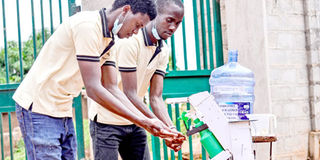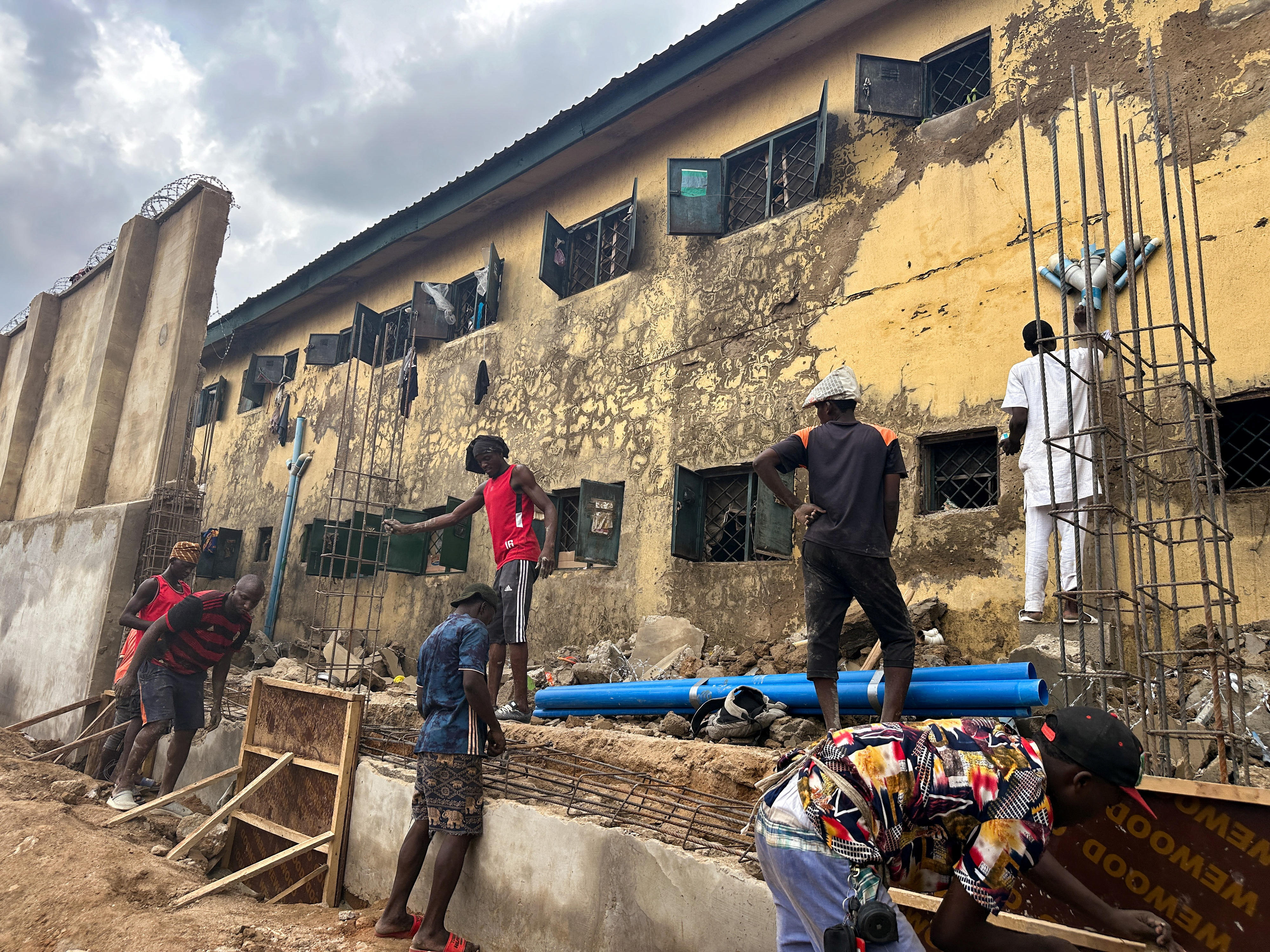Uganda scientists develop devices to fight Covid-19

Demonstration. Students of Islamic University in Uganda, Horus Mwaka (left) and Mansoor Muhammad, demonstrate how the free handwash machine works on April 8. PHOTO BY ABUBAKER LUBOWA
As government introduces more guidelines to curb the spread of Covid-19, a number of local scientists are bringing on board inventions to respond to the pandemic.
Behind the innovations are students and lecturers in different Ugandan universities and experts in private sector in the country.
Among the new innovations are the hand-free hand sanitisers, rapid testing kits for upcountry hospitals and ventilators. A group of students from the Islamic University In Uganda (IUIU) and Kabale University have developed a hand-free hand sanitiser that uses sensors to automatically dispense water and soap for handwashing.
The innovation according to the young scientists is intended to minimise contact with infected surfaces, one of the mechanisms that fuels Covid-19 spread.
Mr Horus Mwaka, the lead developer of technology at IUIU, said the machine’s main components are the tap, a sensor and a tank.
“The machine has sensors, tap on the water tank and soap dispenser, which are automated. You put your hand and it automatically disinfects it,” he said.
Dr Yahya Umar, the lecturer of technology at IUIU, who also heads the laboratory where the machine was developed, said the machine is mounted with motion sensors to make it work automatically.
“When you move your hand close enough to the tap, it opens. There is a micro-controller inside,” he said. “For charging, someone can plug it in the power supply source directly or use solar system. A 15-Watt panel can work but for bigger tank, it requires 50 watts solar panel,” he said.
The motivation was to curb the pandemic but its application is beyond the pandemic. He says the machine was primarily developed for their campuses in the country.
The machine is affordable and can be rolled out to more people with the support of government. “The machine costs Shs150,000 excluding the water tank. The tank can be a jerrycan or a 250-litre can which costs Shs150, 000,” he added.
Mr Duncan Bwengye, the lead innovator for the same type of automated hand-sanitiser at Kabale University, said the lockdown has made it hard to get materials for making the machine.
“With the current quarantine situation, it is hard to get materials to use and also if someone makes an order, it is difficult to deliver their order because of travel restrictions,” Mr Bwengye stated.
Alcohol sanitisers
Production. On March 21, government permitted Ugandan spirits (alcohol) manufacturers to convert 7.3m litres of ethanol into hand sanitisers to fight Covid-19.
The development was subsequently followed by Uganda National Bureau of Standards (UNBS) who last week released a list of 12 industries making standard sanitisers.
Mr Haruna Matovu, the director of Samaka Consults Uganda Ltdd, one of the companies UNBS certified to make the sanitisers, said they are making supplies across their outlets.
Masks and face shields
Locally made. A number of local artisans and textile industries are making masks for the public and medical workers.
Mr Jimmy Mutesa, the head of marketing at Nyanza Textile Industries Ltd (Nytil), said: “We are making affordable masks for the general public. We are in the process to start making for medical workers,” he said.
Last month, Mr Daniel Birungi, the executive director of Uganda Manufacturers Association, said Nice House of Plastics and Crest Foam companies had designed samples of transparent plastic face masks.
Rapid diagnostic kits
Affordable kits. Dr Misaki Wayengera, a lecturer of immunology and molecular biology at Makerere University, said he is manufacturing affordable and faster testing kits for field surveillance teams.
Dr Misaki who also chairs the Ministry of Health Scientific Advisory Committee said local innovations, said this will be crucial in solving the problem of limited supply of testing kits from foreign countries.
He said unlike the current testing kit that requires a complex machine, his kits use a small test tube and can be used in remote hospitals.
He said the testing kits will be ready by end of this month or early next month. Dr Misaki thanked Makerere University for providing the funds.
Ventilators
Cost. Severely ill Covid-19 patients, once placed in the Intensive Care Unit for management, often require a respiratory assistive technology known as a Ventilator.
However, the global demand for ventilators is on the increase. According to experts, the average price for a ventilator is $25,000 (about Shs94.2m) for low income countries like Uganda.
A team of experts at Makerere University are manufacturing low cost ventilators to bolster the country’s capacity to provide critical care in case the demand increases. Prof Barnabas Nawangwe, the Vice Chancellor of Makerere University and the project lead for low cost ventilators, tweeted on April 15: “The team comprising Makerere researchers and engineers from Kiira Motors Corporation has completed the engineering tests on the ventilator prototype successfully. This innovation now moves to the next stage of validation.”




